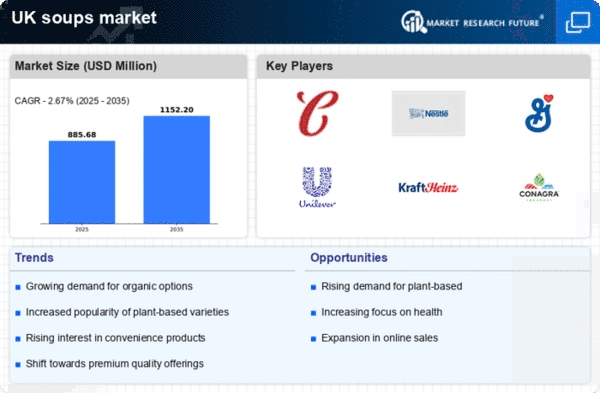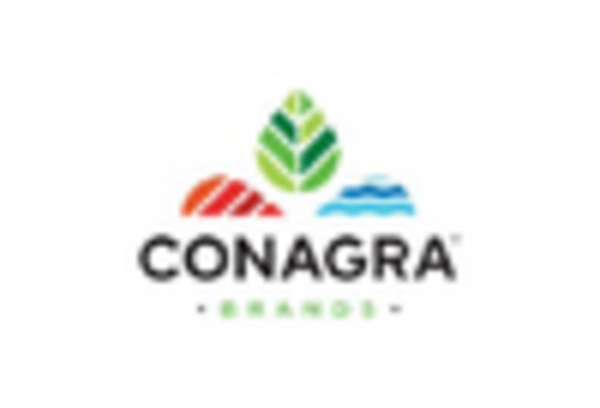Increased Focus on Convenience
In the fast-paced lifestyle of the UK, convenience remains a critical driver for the soups market. Consumers are increasingly seeking quick and easy meal solutions that do not compromise on quality. Ready-to-eat soups, which can be prepared in minutes, are gaining traction among busy professionals and families alike. Recent statistics indicate that the ready-to-eat segment of the soups market has expanded by approximately 15% over the past year. This trend suggests that manufacturers must prioritize convenience in their product offerings, potentially leading to innovations in packaging and preparation methods. The industry may also explore partnerships with retailers to enhance distribution channels, ensuring that these convenient options are readily available to consumers across various platforms.
Growing Interest in Ethnic Flavors
The soups market in the UK is witnessing a surge in interest for diverse and ethnic flavors. As the population becomes more multicultural, consumers are increasingly adventurous in their culinary choices. This trend is reflected in the rising popularity of soups that incorporate spices and ingredients from various global cuisines. Market data suggests that ethnic-flavored soups have seen a growth of around 10% in sales over the last year. This indicates a potential opportunity for brands to diversify their product lines and introduce unique flavor profiles that cater to this evolving palate. By embracing this trend, the soups market can attract a broader audience and enhance consumer engagement through innovative flavor combinations.
Health-Conscious Consumer Behavior
The health-conscious movement is significantly influencing the soups market in the UK. Consumers are becoming more aware of the nutritional content of their food, leading to a demand for soups that are low in sodium, free from artificial additives, and rich in vitamins. Recent surveys indicate that approximately 60% of consumers actively seek out healthier options when purchasing soups. This trend suggests that manufacturers must reformulate existing products to align with these health standards, potentially leading to a rise in organic and functional soups. The industry may also benefit from transparent labeling practices, allowing consumers to make informed choices about their food, thereby fostering trust and loyalty in the brand.
Rising Demand for Plant-Based Options
The soups market in the UK is experiencing a notable shift towards plant-based offerings. This trend is driven by an increasing consumer preference for vegetarian and vegan diets, which are perceived as healthier and more sustainable. According to recent data, the plant-based food sector has seen a growth rate of approximately 20% annually, indicating a robust demand for plant-based soups. This shift is not merely a fad; it reflects a broader societal movement towards healthier eating habits. As consumers become more health-conscious, the soups market is likely to adapt by expanding its range of plant-based products, catering to this growing demographic. The industry must innovate to meet these changing preferences, potentially leading to new product lines that emphasize natural ingredients and nutritional benefits.
Sustainability Initiatives in Production
Sustainability is emerging as a pivotal driver in the soups market, as consumers increasingly prioritize environmentally friendly practices. The UK market is seeing a shift towards sustainable sourcing of ingredients and eco-friendly packaging solutions. Recent reports indicate that around 40% of consumers are willing to pay a premium for products that are sustainably produced. This trend compels manufacturers to adopt greener practices, such as reducing waste and utilizing recyclable materials. By aligning with these sustainability initiatives, the soups market can not only meet consumer expectations but also enhance brand reputation. This focus on sustainability may lead to innovative practices that could redefine production processes and supply chain management within the industry.
















